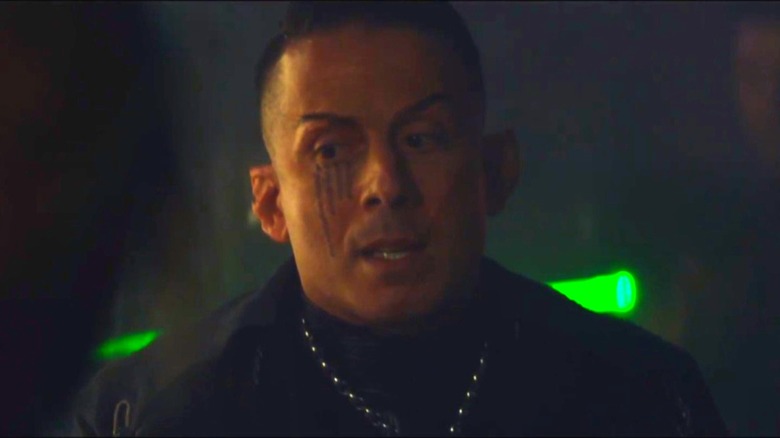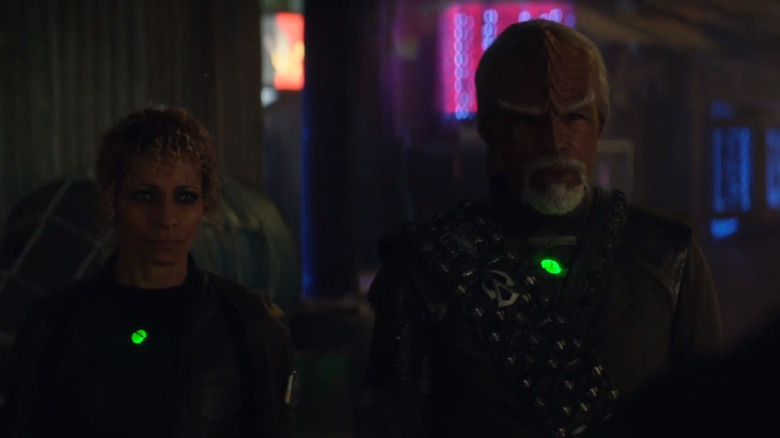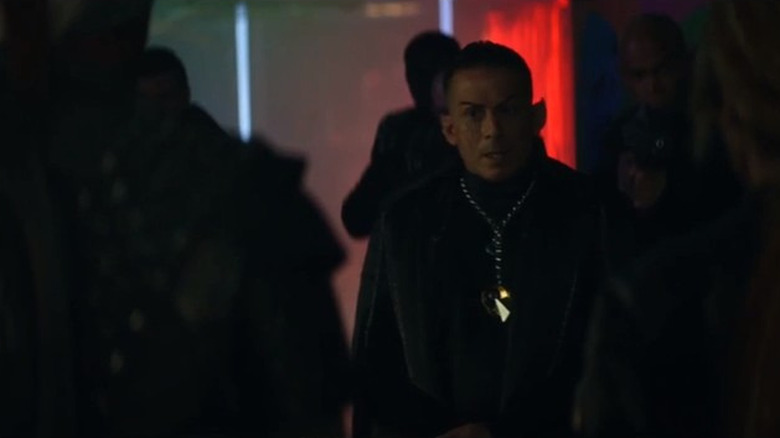Star Trek: Picard Season 3 Introduces Something Totally New To The Trek Universe
This post contains spoilers for the latest episode of "Star Trek: Picard" season 3.
It has long been an issue with "Star Trek" that life outside of Starfleet has never been solidly defined. Most of the Trek shows and all of the movies take place on ships or space stations, and the bulk of characters wear uniforms and adhere to a military-like chain of command. In the mind of "Star Trek" creator Gene Roddenberry, this type of formalism is key to humanity's utopian future. Everything, he seems to have felt, can be talked out in accordance to mature, rule-based parameters. Everything within Starfleet is designed to enhance humanity's stronger impulses and tamp down on its baser instincts toward greed and colonialism.
But not everyone in the universe of "Star Trek" is a member of the Federation. Indeed, there are many worlds that actively reject Starfleet ideals, hoping to retain their addictions to money, vice, and power. Or perhaps they intend to merely operate independently, unwilling to engage in a cultural exchange. Either way, it seems that Starfleet offers any members a very nice, open-minded, explorative way of life, but by their own design, can never insist that others join. As such, there is going to be a vast contingent of civilian life that never gives any thought to starships, missions of peace, or scientific exploration.
But that civilian contingent has never been fully explored in "Star Trek." The franchise's scenes outside of Starfleet's purview tend to lilt toward a generic, sci-fi world that could contain just about anything. In the most recent season of "Picard," the showrunners have attempted to ameliorate the world's vagueness by establishing a working culture of organized crime. For the first time, mob bosses loom large in Roddenberry's world, and not all of the crime bosses are what you might think.
Could you imagine, for instance, a Vulcan crime lord?
Krinn, kingpin of the Vlashi crime syndicate
The B-plot of this season of "Star Trek: Picard" sees Raffi (Michelle Hurd) and Worf (Michael Dorn) investigating the theft of a dangerous portal-based weapon used by the wicked criminal Vadic (Amanda Plummer). Their investigation leads to a web of crime located in a dangerous, undefined city called merely District 6. It is here that one can still find money, drugs, and other things usually unheard of on a starship. Raffi and Worf have already dispatched with the dangerous Ferengi Sneed (Aaron Stanford), but haven't found the information they need. Indeed, the portal weapon they were investigating might very well have been subterfuge, a distraction from the theft of a greater, even more deadly weapon. The two investigators eventually have to look into the dealings of one Krinn, kingpin of the Vlashi crime syndicate, played by actor Kirk Acevedo.
Krinn is a Vulcan, a species that — most Trekkies will be able to tell you — is generally devoted to purging all display of emotions and adhering to the very strict tenets of scientific logic. What, you might ask, is logical about committing crimes? Krinn doesn't get into the details of it, but does mention that an active crime syndicate is a logical endeavor. The notion is interesting enough that "Picard" fans might immediately find themselves longing for a conversation with Krinn about his reasoning. Is a life of crime considered a proper outlet for society's malcontents? Is it the logical outcropping of a capitalist society? Conceptually, it's all very tantalizing.
Crime in the future
Of course there are crimes in the future of "Star Trek," but there wasn't a freelance criminal element on any of the Trek shows until "Star Trek: Deep Space Nine" more closely incorporated the Ferengi, a species devoted to wealth and acquisition. Quark (Armin Shimerman) was constantly flouting the law, running a business in the shadiest fashion he could get away with. Quark, however, was largely depicted as harmless. Not honest, but harmless. Quark wasn't the kind to murder people in order to keep them quiet.
The criminals in "Picard" are decidedly more dangerous, seeing as they trade weapons and drugs, and are very much willing to decapitate rivals; Sneed produces the head of a compatriot to threaten Raffi. Krinn, however, seems far more intimidating. If he has devoted himself to a life of violent crime as a matter of logic, then it will take a great deal of intellectual calisthenics to convince him otherwise. If murdering a stoolie is merely the appropriate course of action, then that's where his morality lies. There's something chilling about that.
Crime, however, seems to be easily stopped in the world of "Star Trek." Worf murders Sneed (to rescue Raffi), and his next visit to District 6 reveals that he is already considered the "alpha" of the local criminals. It seems he unwittingly usurped the throne. If all it takes is bold decisiveness and a sharpened bat'leth, then it seems Krinn or any other criminals may easily be quelled. It seems that the world outside of Starfleet may finally be coming into slightly sharper focus.


